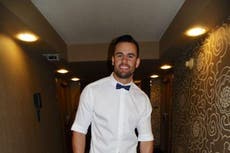Dame Deborah James was given ‘three to five days’ to live, her mother says
James’ mother also shared details of the day her daughter received a damehood from Prince William
The mother of late Dame Deborah James has expressed her gratitude to the public for their support in the weeks leading up to and after her daughter’s death.
The cancer campaigner and podcast host died in June aged 40, six years after being diagnosed with bowel cancer.
During her final months, James was honoured with a damehood that was presented to her by the Duke of Cambridge. She also founded the Bowel Babe Fund to raise money for cancer research. The fund has raised more than £7.4m.
In the first interview since her daughter’s passing, Heather James said the “love of the people out there” meant “a lot” to their family.
“I think I could not have coped [without the public support],” Heather told BBC Breakfast. “We were given three to five days, Deborah lived eight weeks.
“That eight weeks was probably in one way the best eight weeks we’ve had together as a family, even though she died at the end of it,” Heather said.
“How can you not love what she did in that eight weeks and it did help knowing other people loved her and wanted to help in any way they could.”
In May, James revealed on Instagram that she has moved to end-of-life care at her parents’ home in Surrey after her body stopped responding to treatment.
Heather revealed that she had become her daughter’s main carer during those final two months.
“I think the hardest thing was knowing she was going to die. My heartache was knowing as a mother I couldn’t do anything about that and I think that was the hardest for me to cope with,” Heather said.
“We had some good times. I can remember lying in bed, probably just about a week or so before she died and she was quite poorly that night and she went, ‘I do love you’ and I went, ‘I love you’.
“She went ‘I have no regrets’ and I went ‘that’s brilliant’. How many people could say that? But she did say I don’t want to die. And that’s the hardest, saddest part.”
Heather also shared details of the day James received her damehood from Prince William, and what it was like to welcome a member of the royal family into their home.
“He put us so much at ease when he came in. You know, it was amazing,” Heather said of William.
“And he was just like one of my son-in-laws, he just sat down with us. He was so lovely, I think he is a people’s king.”
James’ campaigning had a marked effect. In the weeks following her death, record numbers of people have come forward to be checked for bowel cancer.
According to the NHS, between the months of May and July, 170,500 people have been referred for checks for suspected lower gastro-intestinal cancers.
Genevieve Edwards, chief executive of Bowel Cancer UK, told BBC Breakfast: “[Deborah] was a phenomenal campaigner, and you can just see the impact that she’s had there with people coming forward.
“And if those thousands of people who’ve come forward, the majority of them probably won’t have bowel cancer, but for those that do, that’s lifesaving.
“I’ve spoken to so many people with bowel cancer who’ve felt that they’ve had the confidence to go and tell their own story now because Deborah did so.”
Join our commenting forum
Join thought-provoking conversations, follow other Independent readers and see their replies
Comments


Bookmark popover
Removed from bookmarks